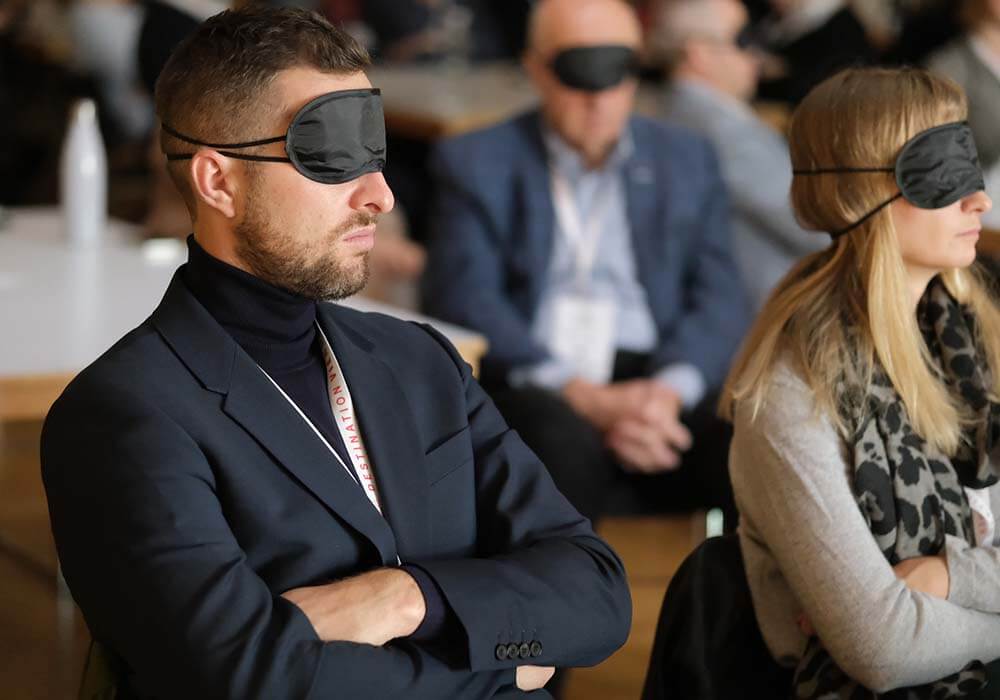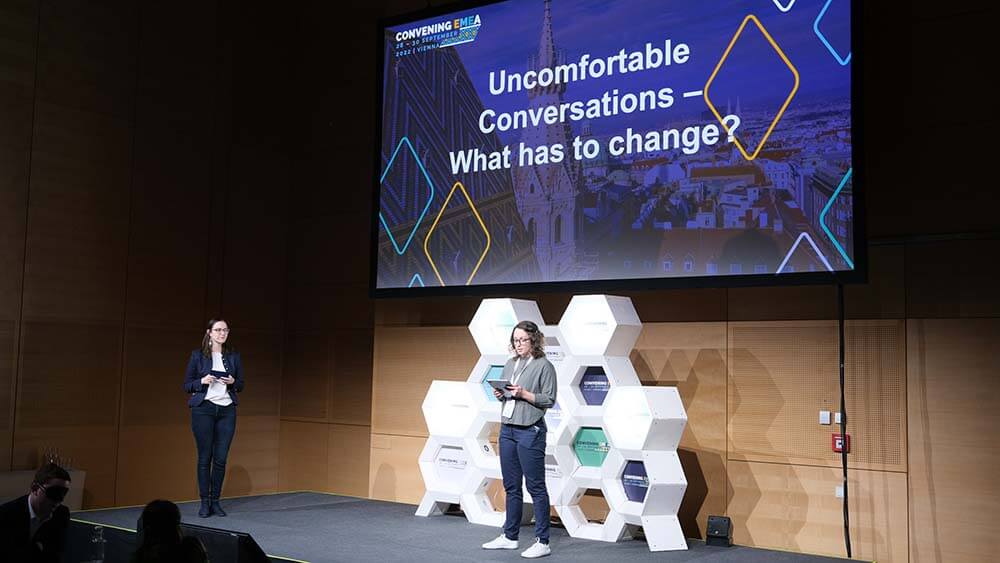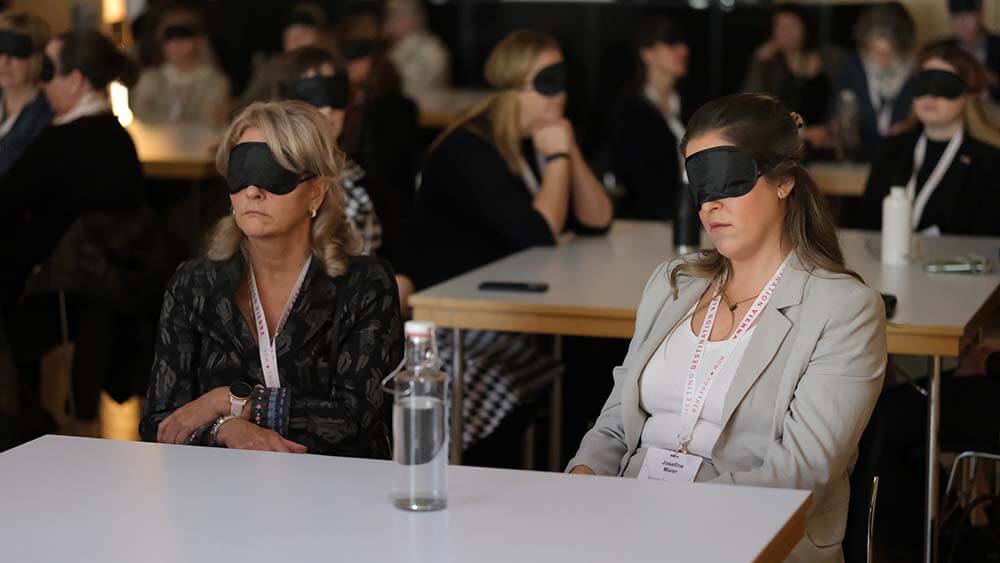
Uncomfortable Conversations participants found wearing the eye masks compelled them to listen to what the presenters — and their table mates — were saying.
If there was one group Jaimé Bennett, PCMA’s regional director, EMEA, knew she wanted to have represented as active participants at Convening EMEA 2022, Sept. 28-30 in Vienna, Austria, it was representatives from the current class and alumni of PCMA’s 20 in Their Twenties, an annual program that recognizes global industry leaders early in their careers who are the future of the events industry.
At the same time, Bennett and her team had tasked themselves with creating unconventional environments at the Messe Wein convention center and creating safe spaces for exploring complex and sensitive topics like sustainability, mental health, and diversity, equity, and inclusion. “Everyone’s talking about these areas,” Bennett said, but not really “addressing what needs to change.”
What they came up with, “Uncomfortable Conversations: What Needs to Change,” ticked all the boxes — and who better to spark a change in mindset than the cohort in their 20s? The idea was that they would introduce the three topics, Bennett said, help lead the conversations among participants at small tables, collect the takeaways afterwards, and share the findings with her and her team.
Bennett also wanted this to become a “legacy project” for each 20 in Their Twenties class, to take those three challenges in different directions and perhaps create a community around them beyond PCMA events.
She reached out to Jack Owens, International Association Conferences at Fáilte Ireland, and a 20 in Their Twenties class of 2021 member, “because he did a conversation starter at last year’s Convening EMEA on mental health,” Bennett said. She also tapped Katherina Path, marketing manager for conventions, Frankfurt Convention Bureau, current class of 2022, recalling that she had spoken about DEI as a She Means Business panelist at IMEX Frankfurt this year. And she invited Magdalina Atanassova, a sustainability advocate, to present.
“I like talking about the topic and I think it was a perfect fit when it came to uncomfortable conversations,” Atanassova, creative director digital at Kenes Group and class of 2015, told Convene. Climate change “is very uncomfortable. And I like digging deep and saying, ‘Yes, it’s uncomfortable, but we need to face the fear.’ So, in a sense, I was assigned to this topic, but I was also very happy to do it.”
Once Owens and Path also enthusiastically agreed to lead the conversations on their designated topics, Bennett said her next big question was: “If it’s an uncomfortable conversation, how do we make people in the room super comfortable? Because you can’t have uncomfortable conversations if you don’t feel the environment is a place you can trust.”
Prioritizing sensory experiences — sight, touch, hearing, and taste — in the overall program design, Bennett considered how taking one sense away for this session could serve to heighten the others. The original idea was to have Uncomfortable Conversations take place in a darkened room, but because that wouldn’t work logistically, she decided to order eye masks instead. Having everyone wear the masks would ensure they were “all in the same state,” she said. “By removing people’s sight, it meant they had to be fully present. They had to listen. They couldn’t judge people visually. And they couldn’t be on their mobile phones. That was the whole thinking behind it.”

Christina Strohschneider (left), a member of the current 20 in Their Twenties class, and Magdalina Atanassova, a 2015 class member, set the stage for the audience.
‘I Wanted to Shock Them a Bit’
For the presenters, who had five minutes each to lay the foundation for their topic, there was a bonus to having the audience wearing masks. “The benefit from a speaker perspective was that I could read what I wrote because I really didn’t want to miss a point of what I wanted to say in just short five minutes,” Atanassova said, and nobody would notice she was reading off a script “because they wouldn’t see me.” Bennett also found that the format put the speakers more at ease.
The time limit was also “a good restraint, because if you have just five minutes, you have to point the listener to a specific direction,” Atanassova said. “I really wanted to challenge them and I specifically picked carbon as the one topic. I tried to concentrate on just a couple of key messages,” she said, “giving them a few pieces that they could grab onto and then discuss. I focused on the fact that recycling is not working, so when people say, ‘We recycled our plastic,’ actually just 9 percent globally is recycled. I wanted to grab their attention on things that they believe they know, but aren’t actually true, and I wanted to shock them a bit. I used ‘climate cancer’ as a new wording for global warming to grab their attention. But I also wanted to give them some hope,” she said, as they discussed their sustainability goals for after the event.
After Owens, Path, and Atanassova had presented, the table participants agreed on which topic they wanted to discuss. Mental health was overwhelmingly the top choice, Bennett said.
“You could hear the buzz in the room,” Atanassova said. “The conversations were going really well.” For those discussing sustainability, she said, some ideas “were super practical. Some really grabbed onto the idea of, ‘Yes, we have to decide on one action and carry it for the year.’”
Michelle Russell is editor in chief of Convene.

The use of eye masks in the Uncomfortable Conversations sessions “gave us time and space to focus, think about what was presented without distraction,” said Simona Milenkova, senior marketing coordinator at Kenes Group and table facilitator for the session.
An Enhanced Experience
Simona Milenkova, senior marketing coordinator at Kenes Group and a member of the 2021 20 in Their Twenties class, was an Uncomfortable Conversations table facilitator who found the use of eye masks made “the conversation on the importance of sustainability, DEI, and mental health even more powerful,” she told Convene via email. “The sensory-deprivation technique gave us time and space to focus, think about what was presented without distraction, and ask ourselves a few uncomfortable questions. … To reach pressing sustainability goals, we all committed to taking more responsibility and making small steps in the right direction such as using more eco-friendly transportation personally and reducing energy consumption and water use on site at our events. It was definitely the most distinguishing session at Convening EMEA this year.”
Likewise, Clark Massad, vice president, global partnerships & convention sponsorships at IGLTA (The International LGBTQ+ Travel Association), found the format to be “very original and thought-provoking.” He especially appreciated, he shared with Convene, that it was executed by “the young leadership. I was excited to participate in a session that had a different approach.”
Wearing the mask, Massad said, “enhanced my experience and made me even more aware of the unconscious biases that we project on a person just because of the sound, pitch, or tone of their voice, or because of an accent. After each person spoke and we removed our masks, it was interesting to see if the individuals corresponded to the images their voices had provoked.”
Ignite Your Path
The Uncomfortable Conversations session format proved so popular that it will be repeated at Convening Leaders 2023, Jan. 8-11, in Columbus, Ohio. Join other industry trailblazers and register for Convening Leaders 2023.
